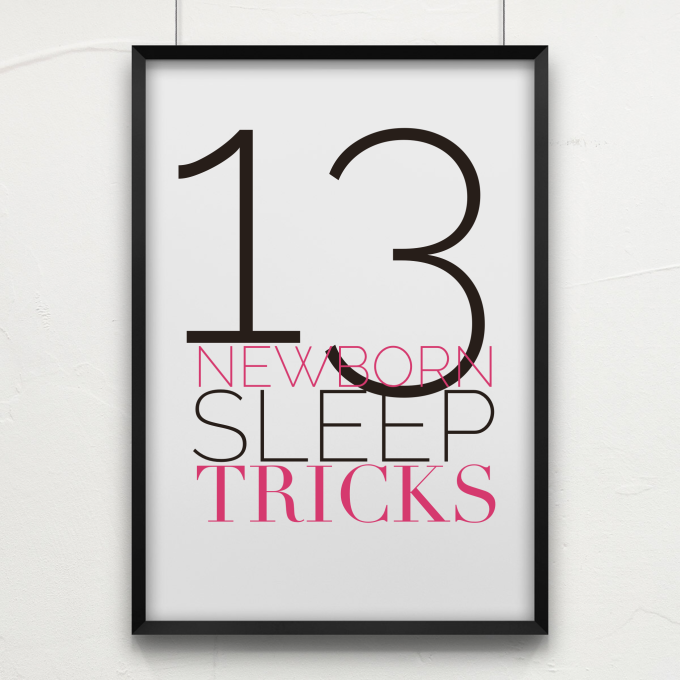Well, it’s been 6 weeks since Abigail was born and we’re still alive and functioning despite limited sleep and another daughter demanding our attention. In thinking about these first couple of weeks and months of having a new baby, I think the number one question new mommies might get is: “are you getting any sleep?”
For me, I can’t complain as we’ve been spoiled with good sleepers. Emma started sleeping 6+ hours by the time she was a month old, and Abby is starting to go 5 hours in between night feedings, which makes a world of a difference! But, this doesn’t seem to be the norm.
While I believe there are numerous factors to why some babies are good sleepers initially and some are not, I do believe there are certain things that are in the parents’ control to create an environment that promotes sleep. I am by no means an expert on this subject, but I think the information that was shared with me via my pediatrician, other moms and parents.com articles is vital.
13 Newborn Sleep Tricks:
~ feed baby before bed: if your baby goes to bed full, he/she is less likely to wake up frequently to want more milk
~ decrease stimulation before laying baby down: this one was hard for us because our time as parents to hang out and watch TV is in the evening after work; however, after we started to decrease stimulation (noise from the TV, bright lights on, etc.), Abigail began to transition from day to night much easier
~ no lights: try your best to keep lights off at night when you wake to change your baby and feed him/her; this keeps light stimulation to a minimum and helps to keep your baby calm making it easier to fall back asleep
~ no talking/singing: although it’s tempting, do not talk or sing to your baby (or at least minimize it) when you change them and feed them at night to keep verbal stimulation at a minimum
~ no eye contact – I actually had not heard of this one before, but read this article today on sleep tips and apparently when you lock eyes with your baby, your baby’s heart rate increases which increases her blood pressure and in turns makes her more alert and awake….go figure. I’m still not sure if I can follow this one yet. 😉
~ regulate temperature: just like adults, babies sleep better in slightly cooler temperatures so try to keep his bedroom warmer during the day and a couple degrees cooler at night
~ use dimmers: using a dimmer at night to change/feed your baby is a great way to keep stimulation at a minimum; for me, I don’t have dimmers in the nursery, so I opt to use the flashlight on my iPhone as it is softer than my lamp light
~ white noise: there are a lot of differing opinions on the use of white noise, but my personal experience is that it can help to sooth and lull your baby to sleep especially if she is used to noise during the day
~ pay attention to what’s in your milk: if you’re breastfeeding and your baby seems to have difficulty transitioning to night sleep or has trouble staying asleep at night, evaluate what you’re eating; just like some foods can increase gas in infants, caffeine could be a culprit in keeping your baby awake
~ rock: sometimes monotonous movement can help lull your baby to sleep; Abigail sometimes struggles to go down initially at night, but I’ve found that if I turn off all the lights and noise, swaddle her tight, and then rock her in her glider she starts to self soothe and falls asleep
~ don’t change diaper with each feeding: this will differ from baby to baby; Emma had super sensitive skin and would get a diaper rash if we didn’t change her diaper frequently; Abby on the other hand can afford to go every other time at night, so if she doesn’t have a full diaper then letting her skip a diaper change keeps her warm and relaxed
~ skip burping: this was another new one for me, but according to this article, babies nurse less avidly at night and therefore take in less air, which means they may not have to be burped; this is huge news for us because it is a struggle to get Abby to burp, so if we can simply lay her down after she’s dozed off from feeding, that’s a win in our book!
~ keep baby exposed to light during the day: this tip from my pediatrician has been so useful; he told us to keep lights on during the day throughout the entire day in order to help Abigail adjust to day time and then keep lights off or dimmed at night to help her acclimate to night hours; it took a couple weeks for us, but we can now lay her down in her crib after her last feeding at 9pm without any crying
Thanks for reading!!
xx – anna





